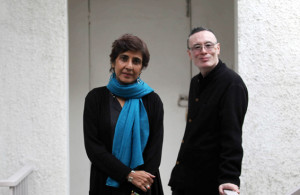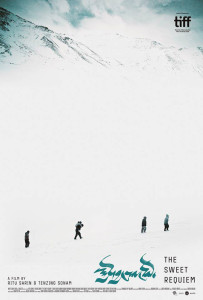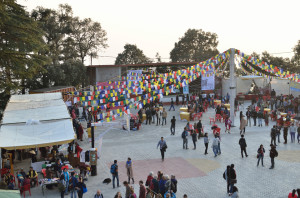By Choekyi Lhamo*
(TibetanReview.net, Nov15, 2018) – This year’s Dharamshala International Film Festival (DIFF 2018), held in the Upper Tibetan Children’s Village (TCV) school, was the seventh edition organised by Ritu Sarin and Tenzing Sonam. Numerous movie enthusiasts and aspiring filmmakers came together to devour all the detailed long shots of unique and moving narratives complete with proper sound systems. Different themes were evoked in the screenings, especially that of narratives pertaining to politics of conflict in specific local spaces.
From the opening night on 4th November, with the feature movie Namdev Bhau: In Search of Silence (Dar Gai), we were given a gist of the ephemeral intensity that we would be fed with during the four days of the festival. Both the organisers welcomed the audience for a rigorous exploration of the self and identity through familiarising us with societies that have been in conflict. The festival focused on featuring independent movies with many of the directors attending and encouraged potential filmmakers to create intriguing visuals for platforms like this. Feature narratives such as Chuskit (Priya Ramasubban), Bhonsle (Devashish Makhija), Hamid (Aijaz Khan), The Red Phallus (Tashi Gyeltshen), The Sweet Requiem (Ritu Sarin and Tenzing Sonam), Ghode Ko Jalebi Khilane Le Ja Riya Hoon (Anamika Haksar), The Gold-Laden Sheep & The Sacred Mountain (Ridham Janve) and many more were shown in the festival. These narratives were focused on the ordinary lives of people and then tried to trace an interesting trajectory with their powerful plots. The documentaries set a sombre tone with films like 48 years: Silent Dictator (Hiroshi Sunairi), The Dispossessed (Mathieu Roy), A Long Way Home (Luc Schaedler) and many more. The intrinsic details of the documentaries and their strong assertions of truth echoed the auditoriums with awe and disbelief. The organisers made sure that the reception of such films worked well with the vendors outside the auditoriums whereby local stalls along with a TCV school’s stall were also there. There were other merchandise shops including one by Students For a Free Tibet and by Tenor who is the owner of an emerging designer brand called Sharlho.
The festival also witnessed the Asian Premier of The Sweet Requiem by the directors Ritu Sarin and Tenzing Sonam. During the movie’s screening, the auditorium felt an upsurge of one’s long forgotten wounds of separation and of their plight to exile. Their successful international premier at the Toronto International Film Festival 2018 was one of the most important markers of their hard work and perseverance. The feature film was one of the most awaited films for the festival and was also one of the organisers’ first movie that was shown in the festival.
The film deals with the story of Dolkar who is an independent woman living in Delhi whilst the narrative also simultaneously narrates her escape from Tibet. Another character, named as Gompo, is the guide for the escaping group of which Dolkar is a part. These two lives meet again in Majnu-ka-Tilla where many things have changed drastically. The troubles of the exile community is narrated through the life of a struggling 26 year old woman with memories of the past that she has difficulty living with. These experiences of exile and the past get resurfaced in the film to remind the prevalent struggle of the Tibetan people and their present dealings in exile.
There were many other interesting aspects of the festival and the films that were screened. In order to get a better insider’s view of the festival and about the film The Sweet Requiem, I had the opportunity to meet with Tenzing Sonam Lak for an interview prior to the festival:
Q: When thinking about films, what kind of stories attract you that eventually become the films you want to work on? What sort of content gets your attention?
A: Ritu and I work together. For us, it is really important that we work on subjects that we care about and subjects that we know something about. As a Tibetan, being born and brought up in exile, the question of Tibet and exile, searching for identity are really important issues for us. We have always made movies which concern these things.
Q: The international premiere of The Sweet Requiem happened at the Toronto international Film Festival 2018. Now we will have the Asian premiere at DIFF. From the trailer, it seems that the film explores the themes of contemporary exile community and it tries to understand the conflict of the exile identity. How did the story come to you and how is it contributing to the change in the exile imagination of Tibet?
A: In the year 2006, there was a shooting incident at Nangpa la pass where a young nun (Kelsang Namtso, 17 year old) was killed and many others were injured. That was the first time somebody managed to film it (a Romanian cameraman). It showed how difficult these escape plans near the border passings have been, especially dangerous during winters. We also saw how brutally the Chinese border guards kill people in cold blood. This incident affected me a lot. And I was thinking of a way to tell that story, maybe in a documentary film or a fictional film, I wasn’t sure. But that was the starting point.
Also, there were so many young Tibetans coming from Tibet who fled as kids when they were 7 or 8 years old to come to exile. TCV was a big destination for these children. We know a lot of them. These kids have a very different existence compared to the kids who were born and brought up in India and have had parents and family. These kids never had parents, many had to leave their parents in Tibet. Most of them lost contact with their families and they never went back. These children were doubly exiled. So, I was curious about exploring this aspect of exile as well. I think, out of these two concerns, the story of The Sweet Requiem grew in my mind and I fictionalised it.
Q: In an interview, you have said that you aspired to be a writer initially. Not to mention that you write your own screenplays for the films. How has your writing evolved from the time you wrote the story for your first feature film Dreaming Lhasa and now with The Sweet Requiem?
A: Dreaming Lhasa was the first fiction film that I wrote. I had no idea what I was doing. It was quite a difficult challenge but Dreaming Lhasa was shot in two years, it was shot in the year 2003 and filmed in 2005. So it’s been more than 10 years since we made another fictional film. The Sweet Requiem’s script was easier to write but the script went through many changes. I started writing the script in 2010 or 2011, and the film was made only last year. I have been working on the script for almost five or six years now. So, during that period, the script really changed. Initially it was set in New York, America. Dolkar was somebody who was living in New York. The script really changed a lot over these years. What also helped was that we got into a writer’s workshop at the Sundance Film Festival. It is an intense mentorship program for scripts which really helped me a lot. Somehow, it was an easier experience even though it took a long time.
Q: After the big success of your film, you have also said that you will now try to put up the film on the international platforms in the near future. Given that you had difficulty in funding before going to TIFF, what kind of difficulties are you now anticipating and how are you going to cope with the finance and other technical problems that you might face in the future?
A: TIFF was a different case as it was the world premier. We had some actors that we wanted to bring to Toronto and we wanted to bring some crew members to the festival as it is a huge platform to unveil the film. We needed to prepare the final technical requirements, so we needed to raise funds for that. But now, it is a question of taking the film to festivals. It is in the hands of the organisers of the various festivals whether they want to select our film or not.
And what we are finding is that a lot of festivals will not select a film like ours, even though it is not overtly political but it is about the Tibetans in exile and it brings the whole Chinese occupation of Tibet into question. They are unlikely to show it as they are so closely linked with China, showing Chinese films and doing other collaborative work with the Chinese films. There are so many good Chinese films that are being made. They don’t want to lose the opportunities of funding and they want to show Chinese movies.
This is the biggest challenge that we face. We are already finding that none of the Asian festivals have taken our film inspite of being a film on the kind of subject that is unique and unexplored. We would think it should be of interest to other Asian counterparts but none of that has happened. This is a bigger challenge where one has to take this film out in the open and overcome the lack of willingness to show a film like ours. Maybe finding alternative ways of programming might help.
Q: In the seventh edition of the Dharamshala International Film Festival, there is a vast range of movies that are going to be screened. There are feature films, documentaries and short films from different parts of the world. Could you talk a bit about the way you choose the films for the festival?
A: When we first started the festival in 2012, it was with an idea of having a film festival in a place like Dharamshala where people don’t get a chance to watch independent films. We never expected it would go to become as big as it has become now, but that idea and our way of choosing the films have remain the same. We curate the programme with the help of other programming advisors that we have. We start out without any preconceptions. All we want from the films is to be moved by a film. We want to feel that this film is important. It can be on any subject from any part of the world, it can be a documentary or a fictional film. We take suggestions from friends from around the world and we contact the sales agents or the distributors for the links and we watch all the films. After this process, we slowly cut down, we shortlist them and the program somehow evolves almost on its own and what we find is that the films we show are always socially relevant. Lot of them tend to be about conflict, be it about Middle East or Arab Spring; this year we are also showing a film about Syria. We also tend to show a lot of personal films which are stories about personal journeys of individual conflict.
Q: A decision was made for the withdrawal of the movie Balekempa by Ere Gowda because of the sexual harassment allegations made against him. There is also a Metoo dedicated session which will try to confront these problems. How do you think about this issue of sexual harassment which has unfurled in the independent film space and what measures do you think the independent film world should be taking?
A: I think nobody in India is surprised that these Metoo allegations are finally coming to light. What is new is that women are finally finding the courage and platform to speak out. For us, in the independent film space, it is a new phenomenon. We are not an industry, we are all filmmakers who are helping each other, collaborating and making these small films. So, we expect that there are higher standards from the independent film world, but, as we found out, that it is not the case. We have found that there is lot of abuse going on here as well.
When the Balekempa allegations came out, we didn’t know how to respond. It was a closing night film and Ere Gowda himself has a very interesting story to tell. He grew up in a village and also worked as an office boy. He really worked his way up and made a beautiful film like Balekempa. So, for us to take a stand and take his film out, it was a really difficult decision but the allegations that were made against him were strong and it came from certain quarters that we knew had to be true. We really had no choice. But soon after that, the producers of the film basically removed the film from all festivals. So, even if we hadn’t taken the film out, it would have been taken out by them eventually.
So, one of the reasons we are having this panel discussion is to come together and discuss about how we respond to these situations within the independent film world. Because when a director of a film is accused, all the other team members who have worked hard on the film suffer as well. As in the case of Balekempa, because Ere Gowda has been accused, all the other people who equally worked hard on this film also suffer. So what kind of response should we have for this problem? I think, in the independent film world, we are still trying to figure it out but it is really important that we take a stand.
Q: Lastly, what do you think of the Tibetan cinema now and how has it evolved in the recent years?
A: When Ritu and I started making films, there were no other films that were made in exile or in Tibet. Then we realised that it is important to make films on Tibet since I was the only person trying to do that then, but that has really changed over the years. Many younger Tibetan filmmakers are keen and interested in films. The emerging Tibetan filmmakers in exile and in Tibet are making excellent films. Through our work, we have worked with a lot of them. At the set of The Sweet Requiem, we had many Tibetan crew members. Our associate director Sonam Tseten was there. Our production manager, line producer, art director, our assistant cameraman, they are all younger Tibetans. I think it was a good experience for them. I am quite optimistic that in the next few years, we will start seeing good films coming out of the exile community world. It is growing in the right direction.
—————–
* Choekyi Lhamo is an MA student at the Centre For English Studies (CES), Jawaharlal Nehru University, New Delhi.







